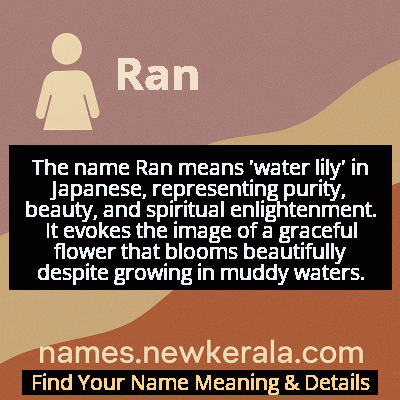Ran Name Meaning & Details
Origin, Popularity, Numerology Analysis & Name Meaning of Ran
Discover the origin, meaning, and cultural significance of the name RAN. Delve into its historical roots and explore the lasting impact it has had on communities and traditions.
Name
Ran
Gender
Female
Origin
Japanese
Lucky Number
6
Meaning of the Name - Ran
The name Ran means 'water lily' in Japanese, representing purity, beauty, and spiritual enlightenment. It evokes the image of a graceful flower that blooms beautifully despite growing in muddy waters.
Ran - Complete Numerology Analysis
Your Numerology Number
Based on Pythagorean Numerology System
Ruling Planet
Venus
Positive Nature
Harmonious, responsible, caring, and artistic.
Negative Traits
Overly idealistic, superficial, possessive, or jealous.
Lucky Colours
Pink, turquoise.
Lucky Days
Friday.
Lucky Stones
Diamond, turquoise.
Harmony Numbers
2, 3, 9.
Best Suited Professions
Artists, musicians, teachers, healthcare workers.
What People Like About You
Warmth, nurturing nature, artistic flair.
Famous People Named Ran
Ran Ito
Actress
Known for roles in Japanese television dramas and films, particularly in romantic and family-oriented productions
Ran Masaki
Singer
Popular Japanese pop singer known for her hit songs during the bubble economy era
Ran Shibuki
Voice Actress
Voice actor for various anime characters in popular series
Ran Mori
Fictional Character
Beloved character from the manga and anime series Detective Conan (Case Closed)
Name Variations & International Equivalents
Click on blue names to explore their detailed meanings. Gray names with will be available soon.
Cultural & Historical Significance
The cultural resonance of Ran extends to Japanese arts and literature, where water lilies frequently appear as motifs representing spiritual purity and transient beauty. In tea ceremony aesthetics and ikebana (flower arrangement), the water lily embodies wabi-sabi principles of imperfect perfection and natural simplicity. The name's connection to these cultural touchstones makes it particularly meaningful for families who value traditional Japanese aesthetics while embracing contemporary naming practices.
Extended Personality Analysis
Individuals named Ran are often perceived as graceful, calm, and deeply intuitive. Like the water lily that grows from muddy waters to produce beautiful flowers, they possess an inner strength and resilience that allows them to thrive in challenging circumstances. They tend to be emotionally balanced individuals who maintain their composure even in difficult situations, much like the water lily that floats serenely regardless of the water's movement. Their quiet confidence and natural elegance often make them appear mysterious or enigmatic to others.
Those named Ran typically exhibit strong empathetic qualities and are often sought out for their wise counsel and calming presence. They have a natural affinity for creative expression and often excel in artistic pursuits that allow them to channel their deep emotional understanding. While they may not be the most outgoing in social situations, they form deep, meaningful connections with those they trust. Their combination of inner strength and outward gentleness makes them particularly effective in roles requiring diplomacy, healing, or creative leadership. They navigate life with a quiet determination that inspires others while maintaining their essential authenticity.
Modern Usage & Popularity
In contemporary Japan, Ran remains a popular but not overly common name for girls, maintaining a balance between traditional appeal and modern simplicity. The name has seen consistent usage over recent decades, often chosen by parents who appreciate nature-inspired names with elegant connotations. Its short, single-syllable structure fits well with modern naming trends while retaining cultural authenticity. While not among the top 50 most popular names, it maintains steady usage across different regions of Japan and continues to be favored for its beautiful imagery and positive associations. The name's popularity reflects a broader trend toward names that combine traditional meanings with contemporary sound and feel.
Symbolic & Spiritual Meanings
The water lily symbolism extends beyond mere floral representation to encompass profound spiritual and philosophical meanings. It represents the journey from darkness to light, as the flower emerges from muddy waters to bloom in pure beauty. This mirrors human spiritual development and the potential for enlightenment despite challenging origins. The flower's daily cycle of opening at dawn and closing at dusk symbolizes rebirth, renewal, and the cyclical nature of life. In broader symbolic contexts, the water lily represents detachment from worldly concerns while remaining grounded, perfect balance between different elements, and the harmonious coexistence of contrasting qualities like strength and gentleness, or rootedness and freedom.

